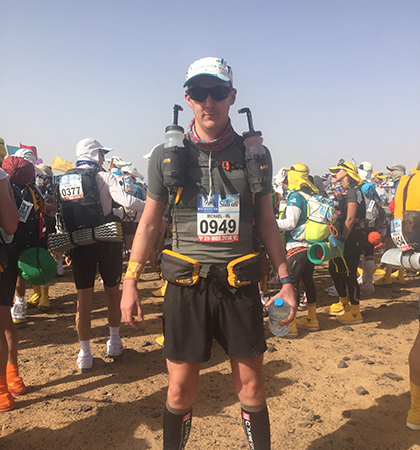LONDON Irishman Michael Frain is a man on a mission to compete in some of the most difficult athletic challenges in the world.
The 34-year-old has just completed the infamous Marathon des Sables, a 258km race in searing hot temperatures across the Sahara Desert in Morocco.
He works for the Department of Education by day but when he is not in the office, this ambitious Irishman whose parents hail from Mayo and Sligo is running up fire escapes and mountains to train.
Mr Frain finished the race in just under 35 hours in 111th place, becoming the top-placed Irishman for the 2016 competition.
His nearest fellow countryman was six hours behind him.
Mr Frain spoke to The Irish Post from the airport in Morocco where he was taking a well-earned rest before flying home to Britain.
Here’s what we’ve learned about the “toughest foot race in the world” and the man who ran it…
1. You need to train a lot
A self-professed couch potato, Mr Frain has previously completed marathons with no training but knew that this time, it would be different.
“I got back from backpacking with my girlfriend in January and have basically trained ever since,” he said.
“We’ve got a fire escape in our block of flats so I’d literally spend three hours running up and down that with 30kg of weights to build up my legs.
“I also trained in Brecon Beacons (Welsh mountains) on weekends.”
 Each competitor carried their own backpack. (Picture: Michael Frain)
Each competitor carried their own backpack. (Picture: Michael Frain)2. It’s hot – very hot
The average daily temperature during the race was 38 degrees but it could easily go past the 40-degree mark; a major change from running in London.
But Mr Frain was well-prepared for the climate.
“I trained in a heat chamber in the sports facility at St Mary’s University in Twickenham,” he said.
“That was set at 38 degrees and you’d literally run in that. I also sat for about half an hour in saunas after a gym session.
“The heat out in Morocco didn’t bother me too much but when you went down into a valley on the course it was like a heat trap and the temperatures were well in excess of 40 degrees, so that made it tougher.”
3. It was pretty difficult to get lost
Terror attacks have seen security measures across Europe raised and this year’s Marathon des Sables was no different.
Following security concerns from some of the competitors, extra measures were introduced to placate their fears.
“Each runner carried a GPS system so that your location could constantly be tracked as you ran,” Mr Frain said.
“Then if you deviated too much from the track, safety officials would come along on 4x4s to lead you back to where you should be.”
4. You appreciate the small comforts
Coming from London to Morocco may be a bit of a shock to the system but Mr Frain quickly became used to his new home - which he carried on his back.
"We each had a backpack that weighed about 10kg with all our stuff in it and naturally this got lighter as the days went on and we ate our food," he said.
He shared a tent with seven other runners and while it was cramped, it barely mattered after a hard day of running 50 miles in 38-degree heat.
"At the end of the stage, we'd go into the tent and unpack our sleeping mat and bag and that was amazing," he said.
"It was great to share the experience with these guys who knew what it was like being out there."
5. Michael Frain is not done yet
Despite running Marathon des Sables, completing a half-Ironman championship in Ireland and countless marathons, Mr Frain is only scratching the surface of his athletic career.
He is coming back to Britain this week – but is not taking too much time to rest.
“My goal now is to compete in the Ironman World Championships in Hawaii,” he revealed.
“It’ll probably be two or three years by the time I get my time down to where it needs to be but that’s my goal.
“I’m going to need about two weeks to allow my body to recover but then I’m going to get back to training.
“I might avoid running for a while and do some gym work and swimming but I’ll definitely start back to some sort of training soon!”


